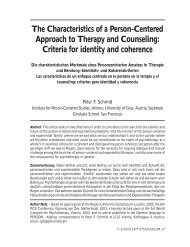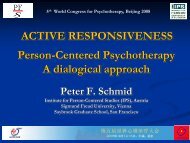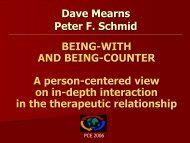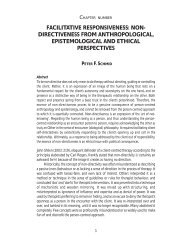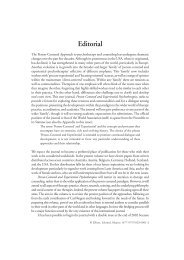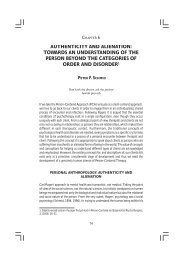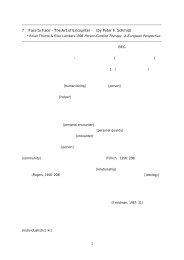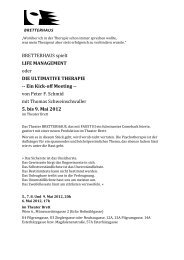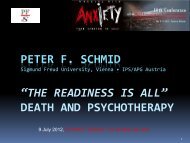IV. Psychotherapy as politics - Peter F. Schmid
IV. Psychotherapy as politics - Peter F. Schmid
IV. Psychotherapy as politics - Peter F. Schmid
Create successful ePaper yourself
Turn your PDF publications into a flip-book with our unique Google optimized e-Paper software.
<strong>Peter</strong> F. <strong>Schmid</strong><br />
Sigmund Freud University, Vienna<br />
Institute for Person-Centered Studies (IPS), Austria<br />
Saybrook Graduate School, San Francisco<br />
<strong>Psychotherapy</strong> is political<br />
or it is not psychotherapy<br />
The actualising tendency<br />
<strong>as</strong> personalizing tendency<br />
BAPCA 3rd National Conference: PCA - P<strong>as</strong>t, Present and Future<br />
Cirencester, Sept 8, 2007
Back to the Client:<br />
A phenomenological approach to the process of<br />
understanding and diagnosis<br />
PCEP 3,1 (2004)<br />
The Challenge of the Other:<br />
Towards dialogical person-centered<br />
psychotherapy and counseling<br />
PCEP 5,4 (2006)
<strong>Psychotherapy</strong> is political<br />
or it is not psychotherapy<br />
The actualizing tendency <strong>as</strong> personalizing tendency<br />
I. Rogers, the PCA & <strong>politics</strong><br />
II. The state of the art of PCT<br />
III. Politics – what's that supposed to mean<br />
<strong>IV</strong>. Horribile dictu: <strong>Psychotherapy</strong> is political
What does <strong>politics</strong> mean
I. Rogers, the PCA & <strong>politics</strong><br />
• Carl Rogers, the social revolutionary<br />
(Richard Farson)<br />
• „The <strong>politics</strong> of the PCA“<br />
(Rogers, 1977)<br />
– no control of the client<br />
– „self ownership“ of the client<br />
– „locus of decision-making is<br />
politically centered in the client“<br />
• Inconsistency: Expertism Self responsibility<br />
• Actualizing tendency:<br />
„The nature of the human being itself is political.“<br />
• PCA <strong>as</strong> a „quiet revolution“
I. Rogers, the PCA & <strong>politics</strong><br />
1. A sensitive person, trying to be of help, becomes more pc, no matter what<br />
orientation she starts from, because she finds that approach more<br />
effective.<br />
2. When you are focused on the person, diagnostic labels become largely<br />
irrelevant.<br />
3. The traditional medical model in psychotherapy is discovered to be largely<br />
in opposition to pcness.<br />
4. Those who can create an effective pc relationship do not necessarily come<br />
from the professionally trained group.<br />
5. The more this pca is implemented and put into practice, the more it is<br />
found to challenge hierarchical models of "treatment" and hierarchical<br />
methods of organization.<br />
6. The very effectiveness of this pca constitutes a threat to professionals,<br />
administrators, and others, and steps are taken - consciously and<br />
unconsciously - to destroy it. It is too revolutionary.<br />
Rogers, The <strong>politics</strong> of the helping professions, 1977, p.28
• Political authors<br />
I. Rogers, the PCA & <strong>politics</strong><br />
– Peggy Natiello<br />
– Maureen O‘Hara<br />
– Gillian Proctor<br />
– Kathida Chantler<br />
– Christoph Fischer<br />
– Mick Cooper<br />
– Pete Sanders and others …<br />
• Politicizing the Person-Centered Approach:<br />
An agenda for social change<br />
edited by Gillian Proctor, Mick Cooper, Pete Sanders & Beryl Malcolm<br />
PCCS Books, 2006<br />
• Feminist approaches, minorities, gay & lesbian issues etc.<br />
– Gay Barfield, Maureen O‘Hara, Carol Gustav Wolterson, Gillian Proctor etc.<br />
– Marietta Winkler, Renata Fuchs, Veronika Prüller-Jagenteufl etc.<br />
– Forthcoming special issue of PCEP re gender issues
I. Rogers, the PCA & <strong>politics</strong><br />
• The <strong>as</strong>sertion:<br />
The PCA is essentially a socio-political approach.<br />
• The evidence:<br />
A socially critical review of the essentials of the<br />
state of the art of PCT.
II. The state of the art of PCT
II. The state of the art of PCT<br />
1 Person<br />
– independence &<br />
interconnectedness<br />
– substantial-relational<br />
nature<br />
– personal anthropology,<br />
phenomenological,<br />
existential
II. The state of the art of PCT<br />
2 Encounter<br />
– the Other<br />
– epistemology of alterity<br />
– Thou-I-relationship<br />
– presence:<br />
being with & being counter<br />
– fundamental We (co-responding)<br />
– bi-(multi-)polar model of psychotherapy
II. The state of the art of PCT<br />
3 Actualizing process <strong>as</strong><br />
personalization
A personalizing tendency:<br />
Philosophical perspectives on the actualizing tendency<br />
axiom and its dialogical and therapeutic<br />
consequences.<br />
In Levitt, B. (Ed.), A positive psychology of human potential:<br />
The person-centred approach.<br />
Ross-on-Wye: PCCS Books, 2007
II. The state of the art of PCT<br />
3 Actualizing process <strong>as</strong><br />
personalization<br />
– energeia-dynamis / act-potency<br />
efficient cause (causa efficiens)<br />
– dialectical understanding of<br />
the actualising tendency<br />
– actualising tendency<br />
<strong>as</strong> social construct<br />
(no development totally-by-itself)<br />
– personalising tendency:<br />
freedom & creativity
II. The state of the art of PCT<br />
4 Dialogue<br />
– <strong>as</strong>ymmetrical:<br />
to be called to respond<br />
– primary occurence<br />
– psychotherapy is realization<br />
of the dialogue that is already<br />
there from the outset
II. The state of the art of PCT<br />
5 Group<br />
– „the Third“<br />
– the group is the primary<br />
locus of therapy<br />
– the group is the interface of<br />
individual & society<br />
– PCA is a group approach
And all that is political.
What does <strong>politics</strong> mean
III. Politics – what does that mean<br />
• πολις [polis]: city-state community<br />
• Aristotle (384-322 v. Chr.):<br />
„ανθρωπος ζωον πολιτικων“<br />
„the human is a being oriented toward the polis“<br />
• „Only in the community is the human being fully human.“<br />
• Politics is the creation of an order that serves<br />
the goal of being fully human.<br />
Everybody is a politician.
III. Politics – what does that mean<br />
• Machiavelli, Hobbes, Weber:<br />
understanding reduced to power issues<br />
• „free of value judgement“, „political realism“:<br />
<strong>politics</strong> „freed“ from the person.<br />
Such <strong>politics</strong> is the business of politicians,<br />
not a t<strong>as</strong>k fo everybody.
<strong>IV</strong>. <strong>Psychotherapy</strong> <strong>as</strong> <strong>politics</strong><br />
• Politics is the consequence of an image of the<br />
human being.<br />
• To act politically means to act according to an<br />
image of the human being.
<strong>IV</strong>. <strong>Psychotherapy</strong> <strong>as</strong> <strong>politics</strong><br />
• <strong>Psychotherapy</strong> is political<br />
or it is not psychotherapy …<br />
• Both, therapy & <strong>politics</strong> are about<br />
understanding & change.<br />
• Discourse among different paradigms<br />
political argument !
<strong>IV</strong>. <strong>Psychotherapy</strong> <strong>as</strong> <strong>politics</strong><br />
Political discourse<br />
– Authenticity vs. alienation<br />
– Dialogue vs. suppression<br />
– Empowerment vs. control<br />
– Creativity & spontaneity vs. structural constraints<br />
– Co-creation vs. diagnosing<br />
– We versus Self: solidarity vs. discrimination<br />
– Group: self-determination & emancipation vs. dependency<br />
– Participation & democracy vs. steering<br />
– Thou-I vs. fear of the Other<br />
– Personalization vs. adaptation to structures
<strong>IV</strong>. <strong>Psychotherapy</strong> <strong>as</strong> <strong>politics</strong><br />
• <strong>Psychotherapy</strong> implies the ethical demand to<br />
act politically.<br />
• Patient or person<br />
Notification of dispute !<br />
Argument instead of stabilization of the system
<strong>IV</strong>. <strong>Psychotherapy</strong> <strong>as</strong> <strong>politics</strong><br />
• The „ political way of being“<br />
– Observation – Judgement - Action<br />
– Political education<br />
– Social criticism in theory, practice, training<br />
– Work with media<br />
– Voice your opinion<br />
– Engagement in institutions<br />
– Co-operation & dispute with other orientations<br />
– Co-operation with other disciplines and professions<br />
– Steadf<strong>as</strong>tness<br />
and much more …
<strong>IV</strong>. <strong>Psychotherapy</strong> <strong>as</strong> <strong>politics</strong><br />
• Discourse among the schools<br />
Take a stand !<br />
– Against resistance through ignorance<br />
– Against resistance through watering down and<br />
playing down the radicalism<br />
– Against destruction through playing down oneself
<strong>IV</strong>. <strong>Psychotherapy</strong> <strong>as</strong> <strong>politics</strong><br />
• “What is most personal<br />
is most general” …<br />
---> is most political !<br />
(Rogers, 1961)
<strong>Psychotherapy</strong> is <strong>politics</strong><br />
or<br />
it is not psychotherapy …
pca-online.net<br />
The Person-Centered<br />
Website<br />
by <strong>Peter</strong> F. <strong>Schmid</strong>



